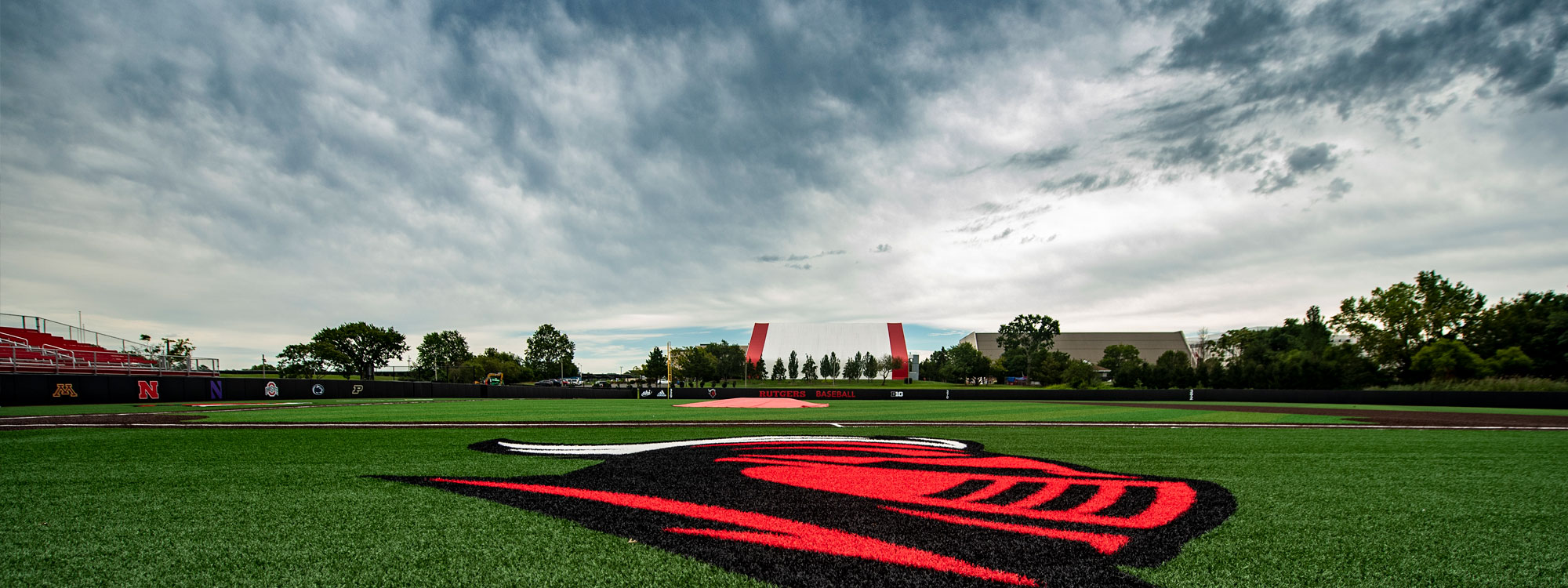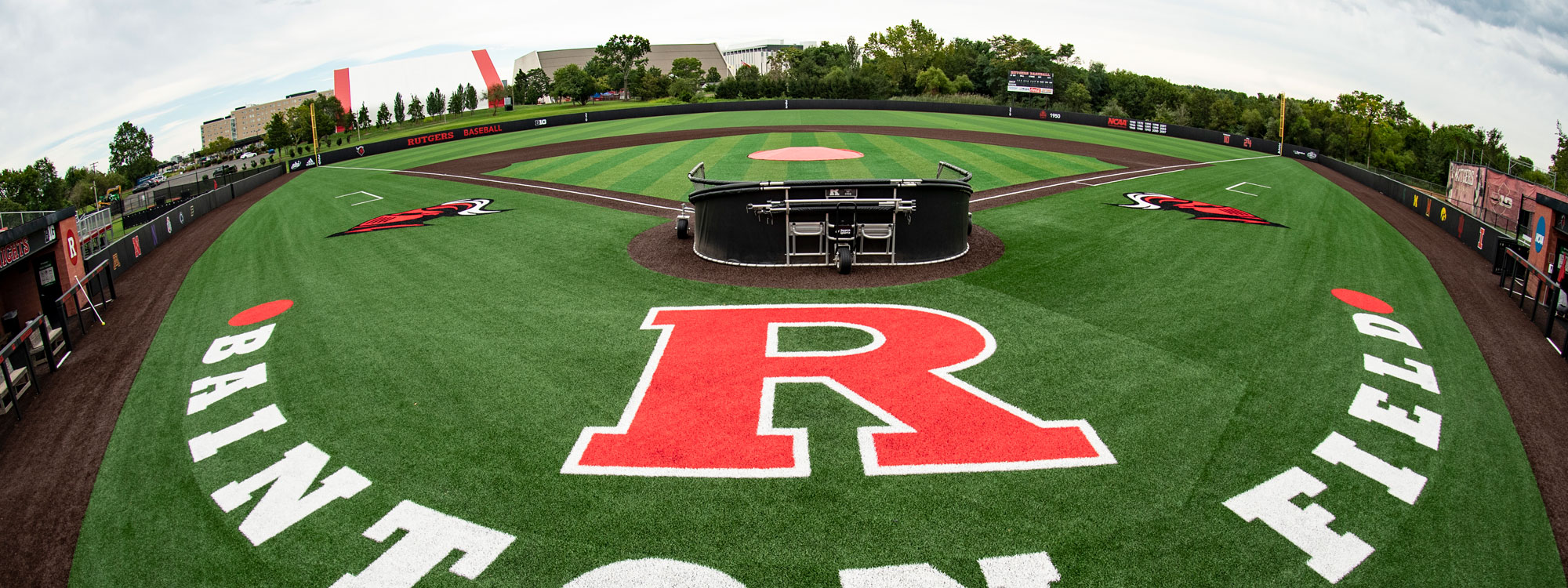Bainton Field
Class of 1953-Gruninger Baseball Complex - Home of Rutgers Baseball
The Rutgers baseball program debuted a new field in 2007. Thanks to the $1.25 million donation - the single largest one-time cash gift by a living donor to Rutgers Athletics at the time - Ron and Pat Bainton gave to the program to use on a brand new state-of-the-art FieldTurf playing surface. FieldTurf, a synthetic surface used in professional and collegiate baseball, football and soccer stadiums across the country, allows the Scarlet Knights to practice on the field year-round without the worries of a frozen surface during the winter months. Dugouts and seating for 1,500 accentuate the field. The generous donation also provides for continued enhancements to the complex in the future. A new outfield wall was constructed recently complete with new padding for the outfield fence in addition to a new sound system. The on-field facilities include a practice diamond and three full length batting cages as well as five practice pitching mounds.
Rutgers baseball also features indoor practice facilities that include three 70-foot batting cages and pitching mounds. The Rutgers Athletic Center, aka the RAC, is also home to a 3,500 square foot weight room in which the baseball team trains. This facility features state-of-the-art equipment that includes free weights, cardiovascular and rehabilitation machines.
In addition, the RAC is home to the team's clubhouse which serves as the team's home away from home. The clubhouse features couches, televisions and an entertainment center as well as a full-time equipment staff that maintains the players' uniforms and equipment to help keep the team properly outfitted. The team locker room was recently renovated with new carpet, furniture and oak lockers for each player.
The baseball team also utilizes a 120-yard indoor facility known as "The Bubble." The facility includes a full-length football field, made out of the same FieldTurf surface as Bainton Field, with 100-foot high ceilings that allow for game-like simulation. The bubble is a vital component of the preseason practice schedule when weather prohibits outdoor activity.
| RUTGERS AT BAINTON FIELD | ||
|---|---|---|
| YEAR | RECORD | % |
| 2007 | 19-3 | .863 |
| 2008 | 10-12-1 | .457 |
| 2009 | 9-12 | .429 |
| 2010 | 15-4 | .789 |
| 2011 | 10-10 | .500 |
| 2012 | 14-6 | .700 |
| 2013 | 12-6 | .667 |
| 2014 | 19-4 | .826 |
| 2015 | 13-10 | .565 |
| 2016 | 16-6 | .667 |
| 2047 | 8-10 | .444 |
| Total | 145-83-1 | .635 |
THE BAINTONS
Field Dedication
On March, 24, 2007, Rutgers christened its brand new field with a doubleheader sweep of Georgetown. Ron Bainton was on hand for the first game and threw out the ceremonial first pitch with former Senior Associate Athletic Director Jason Kroll (left), Head Coach Fred Hill, and former Rutgers University President Dr. Richard L. McCormick (right) on hand to view the festivities at the new Bainton Field.
Ron Bainton's friends in Bellevue, Neb., used to tease him about his football signed by Rutgers coach Greg Schiano and inscribed Rutgers' #1 Football Fan in Nebraska. "It should have said Rutgers' only football fan in Nebraska, they would say," recalls the 1962 graduate of Rutgers College.
But things have changed some since the 2005 Insight Bowl appearance. The Scarlet Knights' gridiron glory prompted Bainton's Midwestern friends and neighbors to begin asking about RutgersÑnot its football program but its academic standing. "Now people are considering sending their kids there," he says.
"That never would have happened without the university getting the exposure that came through the athletic program."
Now, if he and his wife, Pat, have their way, Rutgers is going to become even more well known outside of New Jersey, particularly in Omaha, which is home to the College Baseball World Series. In January of 2006, the couple gave $1.25 million to Rutgers baseball. Their gift, which was the single largest one-time cash gift by a living donor to Rutgers Athletics at the time, was used to purchase and install FieldTurf, a synthetic surface used in professional and collegiate baseball and football stadiums across the country. The new field was re-named Bainton Field in their honor. It provides the foundation for continued enhancements to the Frederick E. Gruninger and Class of 1953 Baseball/Softball Complex.
Inclement weather can render natural grass fields unusable, particularly from January through March. "The FieldTurf allows for use of the baseball field during those winter months, giving the team an opportunity to train outdoors before embarking on a schedule that includes many early season games with schools in the south," explains Jason Kroll, Senior Associate Athletic Director for Development and Marketing. "More times than not, we had been relegated to practicing on the gravel of a parking lot, or worse, inside on the floor of the RAC. The first time we stepped onto an actual baseball field each year is usually the day of our first regular season game. Having FieldTurf changed all of that."
"Over the years, Rutgers has been a darn good team," adds Bainton. "Coach Hill is one of the top coaches in the country and the student-athletes have phenomenal dedication. What Pat and I were trying to do with this gift was give them the opportunity to get to the highest level of Division I baseball."
The FieldTurf also made postponement or cancellation of games scheduled at Rutgers much less likely due to an enhanced draining system and ability to dry faster than natural grass, Kroll notes. Consequently, fewer adjustments to the schedule means there will be less of a strain upon the student-athletes missing classroom time. The donors are also convinced that a better facility helps keep New Jersey players in state while attracting others from out of state.
"You know the movie Field of Dreams," Bainton says. "If we build it, they will come. I really believe that." A baseball lover since childhood, Bainton remembers day trips into New York City from his home in Ridgewood to see major league games. After he and his wife moved outside of Omaha, their attention turned to college ball and they became fixtures at the College Baseball World Series. Year after year, they noticed that southern teams often dominated the finals. So when the University of Nebraska began making appearances in the final eight, Bainton had to investigate. Traveling to the school's Lincoln facility, he was bowled over by their field and decided Rutgers deserved nothing less.
In the spring of 2006, the Baintons visited campus and met with the Scarlet Knights to explain their intentions. After warm thank-yous and handshakes all around, the couple stayed to watch the team warm up before their game against Lafayette. As they did, players made their way over to the couple individually to have a word.
Jim Jansen, a former pitcher for the Scarlet Knights, said, `Sir, unfortunately I won't have the opportunity to play on this new field but I'm so thankful someone is doing this for Rutgers,'" Bainton recalls. "He was talking with us so long, Coach had to come over and tell him to go warm up!"
The Baintons also found out that a number of players have suffered injuries of varying degree while practicing in the parking lot over the years when the field was unusable. Some of those injuries, such as dislocated shoulders, have been season-ending, while others have contributed to the list of nagging ailments that can cause performances to suffer over the course of a season. The team let the Baintons know at the time, because of their gift, future athletes will be spared the risk of training on unsuitable ground. That was the case beginning last season as the Scarlet Knights opened the 2007 campaign with a healthy roster. Making a difference in the lives of students isn't new to the couple. They have long sponsored scholarships for Rutgers students who demonstrate academic merit and financial need; each year two juniors and two seniors receive Bainton Family Scholarships.
Recently he addressed those in attendance at the annual reception where students meet the donors who have helped them, Bainton shared his own background and explained why he and his wife take such pleasure in helping students with their education.
"It gives these students the opportunity to fully take in the Rutgers experience rather than having to drop out to earn more money for tuition," he says.
Financial hardship resonates with the philanthropist, who worked his way though school and relied on help from an older sister who never got the chance herself to attend college.
"We lived in a town where people did well economically, but my parents struggled through the Depression and the World War II years," Bainton recalls. "My sister was an honor roll student, but they couldn't afford to send her to college, and being a female at a time when colleges were focused on supporting ex-military with the GI Bill, she didn't get the opportunity to go."
A middle-of-the-road student in high school, Bainton flourished at Rutgers, he believes, because of the influence of three professors: the history department's Richard McCormick and Warren Sussman, and then University President Mason Gross, who taught philosophy. In 2007, Bainton got the opportunity to throw out the ceremonial first pitch at the home opener with now Rutgers University President McCormick on the field to watch.
"They opened my horizons beyond what I thought possible," he says. From there, he embarked on a 30-year career with the Air Force, retiring in 1992 as a colonel, and eventually moving into private financial consulting work. Throughout those years, Rutgers remained dear to his heart. Grateful to the school's administrative leaders and educators who have made his alma mater one of the best public research institutions in the country, Bainton is determined to do his part in stewarding this great state resource. Bainton Field, he says, is just the first step.
"Now that this is done, the goal is to move forward to get supporting pieces of the puzzle; practice areas, bullpens, batting cages, better dugouts, and finally a stadium effect for supporters," he says. "That's my view. The athletic program is important internally to the university and externally to the future of the university. Because of athletics, you won't hear anybody asking what a Rutgers is anymore."
Directions



